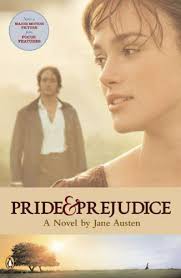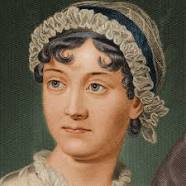Pride and Prejudice Page #2
Pride and Prejudice is a romantic novel by Jane Austen, first published in 1813. The story charts the emotional development of the protagonist, Elizabeth Bennet, who learns the error of making hasty judgments and comes to appreciate the difference between the superficial and the essential. The comedy of the writing lies in the depiction of manners, education, marriage, and money during the British Regency period.
Genre: Romance
Genre: Romance
- Year:
- 1813
- 575,103 Views
“Then, my dear, you may have the advantage of your friend, and introduce Mr. Bingley to her.” “Impossible, Mr. Bennet, impossible, when I am not acquainted with him myself; how can you be so teasing?” “I honour your circumspection. A fortnight's acquaintance is certainly very little. One cannot know what a man really is by the end of a fortnight. But if we do not venture somebody else will; and after all, Mrs. Long and her neices must stand their chance; and, therefore, as she will think it an act of kindness, if you decline the office, I will take it on myself.” The girls stared at their father. Mrs. Bennet said only, “Nonsense, nonsense!” “What can be the meaning of that emphatic exclamation?” cried he. “Do you consider the forms of introduction, and the stress that is laid on them, as nonsense? I cannot quite agree with you there. What say you, Mary? For you are a young lady of deep reflection, I know, and read great books and make extracts.” Mary wished to say something sensible, but knew not how. “While Mary is adjusting her ideas,” he continued, “let us return to Mr. Bingley.” “I am sick of Mr. Bingley,” cried his wife. “I am sorry to hear that; but why did not you tell me that before? If I had known as much this morning I certainly would not have called on him. It is very unlucky; but as I have actually paid the visit, we cannot escape the acquaintance now.” The astonishment of the ladies was just what he wished; that of Mrs. Bennet perhaps surpassing the rest; though, when the first tumult of joy was over, she began to declare that it was what she had expected all the while. “How good it was in you, my dear Mr. Bennet! But I knew I should persuade you at last. I was sure you loved your girls too well to neglect such an acquaintance. Well, how pleased I am! and it is such a good joke, too, that you should have gone this morning and never said a word about it till now.” “Now, Kitty, you may cough as much as you choose,” said Mr. Bennet; and, as he spoke, he left the room, fatigued with the raptures of his wife. “What an excellent father you have, girls!” said she, when the door was shut. “I do not know how you will ever make him amends for his kindness; or me, either, for that matter. At our time of life it is not so pleasant, I can tell you, to be making new acquaintances every day; but for your sakes, we would do anything. Lydia, my love, though you are the youngest, I dare say Mr. Bingley will dance with you at the next ball.” “Oh!” said Lydia stoutly, “I am not afraid; for though I am the youngest, I'm the tallest.” The rest of the evening was spent in conjecturing how soon he would return Mr. Bennet's visit, and determining when they should ask him to dinner. Chapter 3 Not all that Mrs. Bennet, however, with the assistance of her five daughters, could ask on the subject, was sufficient to draw from her husband any satisfactory description of Mr. Bingley. They attacked him in various ways--with barefaced questions, ingenious suppositions, and distant surmises; but he eluded the skill of them all, and they were at last obliged to accept the second-hand intelligence of their neighbour, Lady Lucas. Her report was highly favourable. Sir William had been delighted with him. He was quite young, wonderfully handsome, extremely agreeable, and, to crown the whole, he meant to be at the next assembly with a large party. Nothing could be more delightful! To be fond of dancing was a certain step towards falling in love; and very lively hopes of Mr. Bingley's heart were entertained.
Translation
Translate and read this book in other languages:
Select another language:
- - Select -
- 简体中文 (Chinese - Simplified)
- 繁體中文 (Chinese - Traditional)
- Español (Spanish)
- Esperanto (Esperanto)
- 日本語 (Japanese)
- Português (Portuguese)
- Deutsch (German)
- العربية (Arabic)
- Français (French)
- Русский (Russian)
- ಕನ್ನಡ (Kannada)
- 한국어 (Korean)
- עברית (Hebrew)
- Gaeilge (Irish)
- Українська (Ukrainian)
- اردو (Urdu)
- Magyar (Hungarian)
- मानक हिन्दी (Hindi)
- Indonesia (Indonesian)
- Italiano (Italian)
- தமிழ் (Tamil)
- Türkçe (Turkish)
- తెలుగు (Telugu)
- ภาษาไทย (Thai)
- Tiếng Việt (Vietnamese)
- Čeština (Czech)
- Polski (Polish)
- Bahasa Indonesia (Indonesian)
- Românește (Romanian)
- Nederlands (Dutch)
- Ελληνικά (Greek)
- Latinum (Latin)
- Svenska (Swedish)
- Dansk (Danish)
- Suomi (Finnish)
- فارسی (Persian)
- ייִדיש (Yiddish)
- հայերեն (Armenian)
- Norsk (Norwegian)
- English (English)
Citation
Use the citation below to add this book to your bibliography:
Style:MLAChicagoAPA
"Pride and Prejudice Books." Literature.com. STANDS4 LLC, 2024. Web. 27 Apr. 2024. <https://www.literature.com/book/pride_and_prejudice_9>.




Discuss this Pride and Prejudice book with the community:
Report Comment
We're doing our best to make sure our content is useful, accurate and safe.
If by any chance you spot an inappropriate comment while navigating through our website please use this form to let us know, and we'll take care of it shortly.
Attachment
You need to be logged in to favorite.
Log In